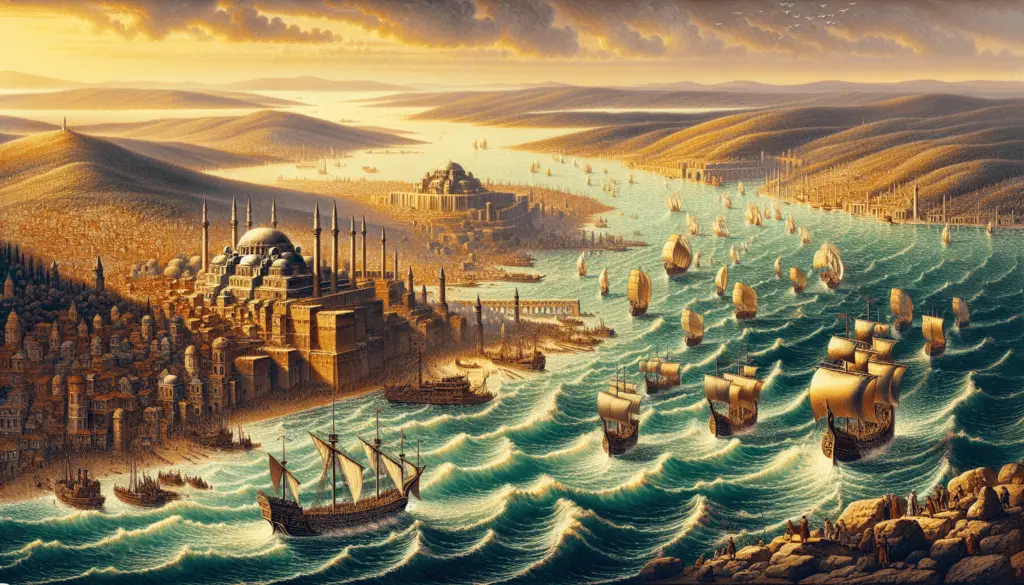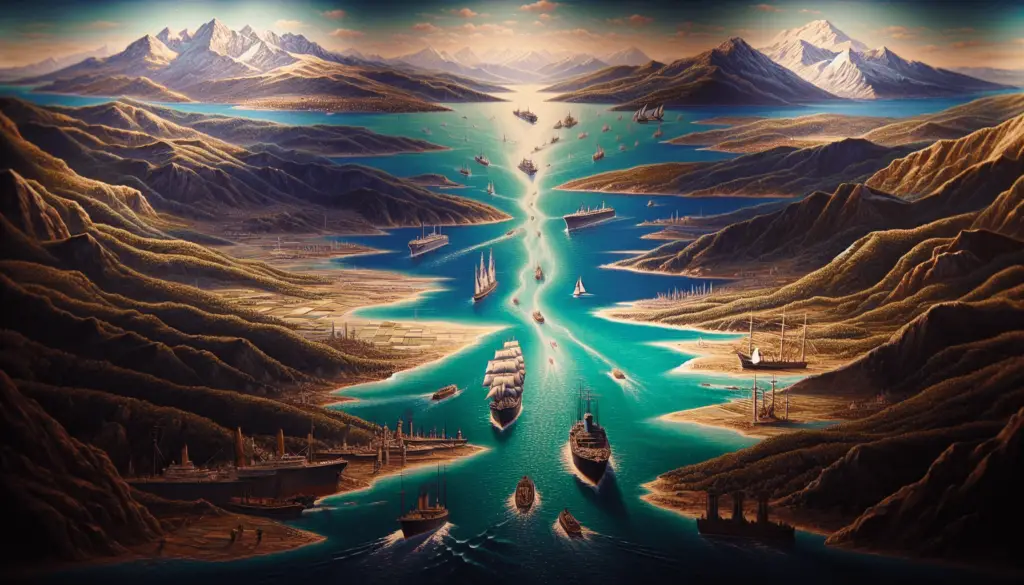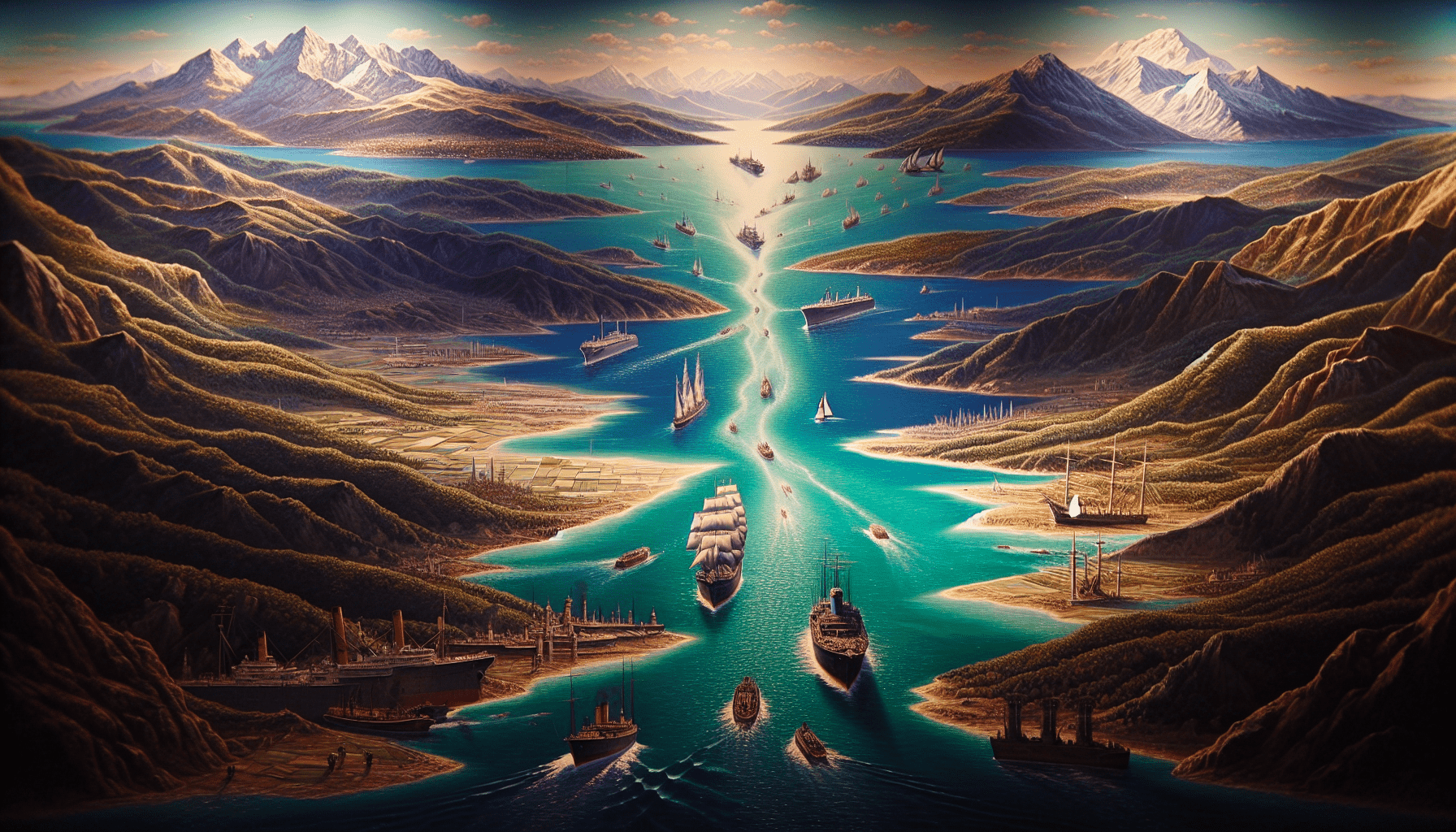Imagine a narrow passage where two continents meet, linking the Mediterranean Sea to the Black Sea. This seemingly unassuming stretch of water holds immense significance in global history, geography, and politics. Known as the Dardanelles, this strategic waterway has witnessed centuries of struggles and conflicts, shaping the destinies of nations and affecting the balance of power in the world. In this article, we will explore the key reasons why the Dardanelles holds such immense strategic importance and continues to play a vital role in the dynamics of international relations. Whether you are a history enthusiast, a geopolitical analyst, or simply curious about the intricacies of global affairs, join us as we uncover the fascinating tale of the Dardanelles.
History of the Dardanelles
Ancient and medieval use
The history of the Dardanelles dates back to ancient times, where it played a crucial role in trade and military strategies. Ancient civilizations, such as the Greeks, Romans, and Persians, recognized the value of controlling this narrow strait. It provided a direct connection between the Aegean Sea and the Sea of Marmara, allowing for easier navigation and access to important trade routes. In medieval times, the Dardanelles continued to be a significant passageway, serving as a gateway between Europe and Asia.
Ottoman era
During the Ottoman era, the Dardanelles gained even more importance. The Ottomans recognized its strategic value and established control over the region. They fortified the area with castles and forts, further solidifying their control over naval movements and trade routes. The Ottoman Empire understood the military advantage provided by the Dardanelles, making it an integral part of their empire.
20th-century conflicts
The significance of the Dardanelles was highlighted once again during the 20th century. In World War I, the Allies attempted to capture the Dardanelles in order to gain control of the Ottoman Empire and secure access to the Black Sea. This resulted in the infamous Gallipoli Campaign, where both sides suffered heavy casualties. The Dardanelles remained a focal point of conflict during various periods, showcasing its ongoing geopolitical importance.
Geographical Location
Connects the Aegean Sea with the Sea of Marmara
Situated in northwestern Turkey, the Dardanelles is a narrow strait that connects the Aegean Sea in the west with the Sea of Marmara in the east. This geographic feature serves as a natural corridor, facilitating maritime transportation and trade between these two bodies of water. The Dardanelles acts as a vital link in the transportation network, enabling the movement of goods and resources.
Forms a natural border between Europe and Asia
The Dardanelles holds immense geopolitical significance as it forms a natural border between Europe and Asia. This unique geographical position grants the region a key role in connection and interaction between the two continents. The strait serves as a symbol of unity and division, marking the geographical frontier between these two major regions.
Close proximity to major trade routes
Being located in such close proximity to major trade routes, the Dardanelles is excellently positioned to tap into international commerce. It sits along the route connecting the Black Sea to the Mediterranean, making it a critical point of transit for both regional and global trade. The strait’s strategic location attracts numerous vessels, ranging from container ships transporting goods to oil tankers moving vital energy resources.

Control of Trade Routes
Access to the Black Sea
One of the primary reasons for the Dardanelles’ strategic importance lies in its access to the Black Sea. The strait serves as the only natural passage for ships traveling between the Mediterranean and the Black Sea region. This control over the passage enables nations to exert influence over trade and navigation within the Black Sea, impacting the economic and political dynamics of the region.
Gateway to the Mediterranean
Controlling the Dardanelles also grants dominance over the gateway to the Mediterranean Sea. It serves as the entry point for maritime traffic entering the Mediterranean from various parts of the world. Nations that hold power over this passage have the ability to monitor and regulate shipping movements, potentially shaping regional dynamics and exerting control over important seaborne trade.
Strategic position for global shipping
The Dardanelles’ strategic position also makes it a crucial checkpoint for global shipping. It lies along major international shipping routes connecting Europe, Asia, and the Middle East. Countries with control over the Dardanelles can influence the flow of goods, impacting global supply chains and trade patterns. The ability to regulate and secure this passage offers significant political and economic advantages.
Military Significance
Defensive advantages
The Dardanelles’ narrow width combined with its geographical and topographical characteristics offers significant defensive advantages. Military forces defending the area can establish control over the strait, limiting the ability of enemy forces to traverse the region. The fortification of the Dardanelles by the Ottomans and subsequent developments in military technology showcase the importance of this location in terms of defensive strategies.
Control over naval movements
Having control over the Dardanelles provides the ability to monitor and regulate naval movements. The strait acts as a chokepoint, allowing nations to restrict or permit access to certain areas. This control over naval activities affects naval warfare, trade routes, and the movement and positioning of naval forces. The power to control naval movements through the Dardanelles has played a significant role in many conflicts throughout history.
Ability to block or allow access
The ability to block or allow access through the Dardanelles grants immense power to those who hold control over the strait. By obstructing or permitting passage, a nation can wield significant influence over trade, military operations, and geopolitics. This control over access can be used as a deterrent, a means of negotiation, or as a tool to assert dominance and project power.

Political Implications
Influence on regional power dynamics
The Dardanelles’ strategic importance has significant implications for regional power dynamics. Nations that control the strait possess a valuable asset and can shape political arrangements in the region. The ability to regulate trade, restrict access, and project military strength influences the balance of power among neighboring countries. Control over the Dardanelles can become a crucial element in negotiations and geopolitical agreements.
Tension between nations
The control and management of the Dardanelles have been a source of tension between nations. Its strategic value has led to conflicts and rivalries throughout history. Disputes over access, dominance, and navigation rights have sparked geopolitical struggles, diplomatic negotiations, and even military confrontations. The Dardanelles’ political implications have the potential to escalate tensions and impact international relations.
An important bargaining chip
The Dardanelles’ significance as a bargaining chip cannot be understated. Countries that possess control or influence over the strait can utilize it to negotiate favorable terms and agreements. In geopolitical negotiations, the Dardanelles can provide leverage and become a key element in the resolution of conflicts or the establishment of cooperative relationships. Its value as a bargaining chip adds another layer of strategic importance to the strait.
Energy Security
Key transit route for oil and gas
The Dardanelles plays a critical role in ensuring energy security due to its position as a key transit route for oil and gas. Vessels transporting petroleum products and liquefied natural gas (LNG) from the Black Sea and the Caspian Sea must pass through the strait. Any disruption or control over the Dardanelles can impact the flow of these vital energy resources to global markets.
Impact on global energy markets
Given the importance of the Dardanelles in energy transportation, any disruptions to the flow of oil and gas through the strait can have a significant impact on global energy markets. Delays, conflicts, or restrictions in the Dardanelles may affect energy prices, supply chains, and the overall stability of the global energy market. The strait’s role in energy security is closely monitored by nations and energy companies worldwide.
Vulnerable to disruptions and conflicts
The vulnerability of the Dardanelles to disruptions and conflicts poses a threat to global energy security. The strait’s narrow width and significant maritime traffic make it susceptible to accidents, maritime incidents, and potential conflicts. Any disruption in the flow of energy resources through the strait could have far-reaching effects on energy markets and regional stability.
Environmental Concerns
Potential for maritime accidents
The high maritime traffic passing through the Dardanelles presents the potential for maritime accidents. The narrowness of the strait and the challenges of maneuvering large vessels in often congested conditions increase the risk of collisions, groundings, and other incidents. Any maritime accident in the Dardanelles could have severe consequences, including oil spills and environmental damage.
Risk of pollution and ecosystem damage
The Dardanelles’ proximity to major trade routes and significant maritime activity poses a risk of pollution and ecosystem damage. Accidental spills, illegal discharge of pollutants, and the release of harmful substances during maritime incidents can severely impact the marine environment. The unique ecosystems and diverse marine life in the Dardanelles region require conservation efforts to mitigate environmental risks.
Importance of conservation efforts
Recognizing the environmental concerns associated with the Dardanelles, conservation efforts are crucial. By implementing measures to prevent pollution, enhancing emergency response capabilities, and promoting sustainable practices, the environmental impact of the strait can be minimized. Preservation of the Dardanelles’ ecosystem ensures the long-term viability of the region’s marine life and sustains its ecological diversity.
Tourism and Economic Development
Attractions for visitors and tourists
The Dardanelles region offers various attractions for visitors and tourists. Its historical significance, cultural heritage, and natural landscapes draw tourists from around the world. Historical sites like the ancient city of Troy, the Gallipoli Peninsula, and the castles along the strait provide opportunities for cultural enrichment and education. The Dardanelles’ unique geographical and historical characteristics make it a popular destination for those interested in history, archaeology, and natural beauty.
Boost to local economies
Tourism in the Dardanelles region provides a significant boost to local economies. The influx of tourists stimulates economic activities, such as hospitality, transportation, and retail. The revenue generated from tourism supports local businesses, creates employment opportunities, and contributes to the overall development of the region. The Dardanelles’ tourism potential plays a vital role in the economic well-being of local communities.
Strategic investments in infrastructure
Recognizing the economic benefits of tourism and the need to support its growth, strategic investments in infrastructure are crucial. Enhancing transportation networks, improving accommodation options, and developing visitor facilities contribute to the overall tourist experience. These investments attract more visitors, extend their length of stay, and encourage repeat visits, further driving economic development in the Dardanelles region.
Cultural and Historical Heritage
Rich cultural significance
The Dardanelles holds rich cultural significance due to its historical and geographical heritage. It has been a crossroads of civilizations throughout history, witnessing the rise and fall of empires, and hosting diverse cultures. The region’s cultural significance is reflected in its archaeological sites, architectural landmarks, and traditional practices. The preservation and celebration of this cultural heritage are vital in fostering a sense of identity and promoting cultural exchange.
Historical sites and landmarks
The Dardanelles region is home to numerous historical sites and landmarks that attract visitors and scholars alike. From the legendary ancient city of Troy to the well-preserved castles and forts, the region offers tangible connections to its storied past. The Gallipoli Peninsula serves as a commemorative site for the World War I campaign, honoring the sacrifices made by soldiers from various nations. These historical sites and landmarks contribute to the Dardanelles’ cultural heritage and serve as educational resources.
Preservation of heritage
Preserving the cultural and historical heritage of the Dardanelles is a shared responsibility. By implementing conservation measures, conducting archaeological research, and promoting cultural tourism, the region’s heritage can be protected and celebrated. International cooperation and collaboration among local communities, governments, and heritage organizations play a critical role in safeguarding the unique cultural legacy of the Dardanelles.
Geostrategic Considerations in Modern Times
Impact on regional security
The Dardanelles’ strategic importance continues to impact regional security in modern times. Its proximity to conflict-prone areas and its role in energy transportation make it a critical component in regional security discussions. Nations bordering the strait closely monitor its developments and seek to ensure stability and cooperation to maintain the free flow of goods, secure maritime trade, and prevent conflicts that could disrupt regional security.
Role in global politics
The Dardanelles’ geostrategic position endows it with a role in global politics. Its significance stretches far beyond its immediate region, as it is part of key international trade routes and energy supply chains. The ability to regulate access and movements through the Dardanelles gives nations involved in global politics a platform to exert their influence and negotiate favorable arrangements. The strait’s role in global politics is influenced by numerous factors, including military strength, economic interests, and diplomatic maneuvering.
International cooperation and conflicts
The Dardanelles has witnessed both international cooperation and conflicts due to its strategic importance. Its control requires collaboration among nations to maintain stability and ensure the free passage of ships. International agreements, such as the Montreux Convention, regulate naval movements and provide guidelines for the strait’s management. However, conflicts and rivalries among nations vying for control have also emerged, highlighting the ongoing challenges in maintaining international cooperation in this crucial region.
In conclusion, the history, geographical location, and strategic significance of the Dardanelles make it a prominent feature in global affairs. From ancient civilizations to modern times, its control has influenced trade, military strategies, and regional power dynamics. The Dardanelles’ role as a bridge between Europe and Asia, its control over trade routes, and its military significance highlight its geostrategic importance. Furthermore, the Dardanelles’ impact on energy security, environmental concerns, tourism, and cultural heritage showcases its multifaceted significance. As the world continues to navigate global politics and security, the Dardanelles remains a focal point for cooperation, conflicts, and negotiations, shaping the future of the region and beyond.

